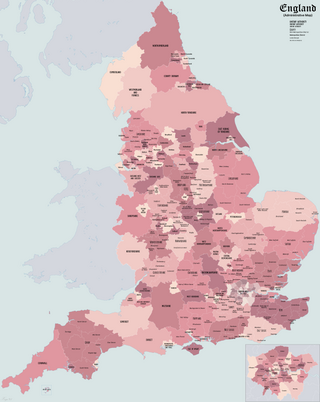
Nottinghamshire is a ceremonial county in the East Midlands of England. The county borders South Yorkshire to the north-west, Lincolnshire to the east, Leicestershire to the south, and Derbyshire to the west. The largest settlement is the city of Nottingham (323,632), which is also the county town.

Metropolitan counties are a subdivision of England which were originally used for local government. There are six metropolitan counties: Greater Manchester, Merseyside, South Yorkshire, Tyne and Wear, West Midlands and West Yorkshire.

South Yorkshire is a ceremonial county in the Yorkshire and the Humber region of England. It borders North Yorkshire and West Yorkshire to the north, the East Riding of Yorkshire to the north-east, Lincolnshire to the east, Nottinghamshire to the south-east, and Derbyshire to the south and west. The largest settlement is the city of Sheffield.

The subdivisions of England constitute a hierarchy of administrative divisions and non-administrative ceremonial areas.

The West Midlands is one of nine official regions of England at the first level of International Territorial Level for statistical purposes. It covers the western half of the area known traditionally as the Midlands. The region consists of the counties of Herefordshire, Shropshire, Staffordshire, Warwickshire, West Midlands and Worcestershire. The region has seven cities: Birmingham, Coventry, Hereford, Lichfield, Stoke-on-Trent, Wolverhampton and Worcester.

The regional chambers of England were a group of indirectly elected regional bodies that were created by the provisions of the Regional Development Agencies Act 1998. There were eight regional chambers, one for each of the regions of England except Greater London, which had opted for an elected mayor and assembly in 1998. All eight regional chambers had adopted the title "regional assembly" or "assembly" as part of their name, though this was not an official status in law. The chambers were abolished over a two-year period between 31 March 2008 and 31 March 2010 and some of their functions were assumed by newly established local authority leaders' boards.
Strategic health authorities (SHA) were part of the structure of the National Health Service in England between 2002 and 2013. Each SHA was responsible for managing performance, enacting directives and implementing health policy as required by the Department of Health at a regional level. Initially 28 in number, they were reduced to 10 in 2006. Along with primary care trusts, they were replaced by clinical commissioning groups and Public Health England in 2013 under the Health and Social Care Act 2012.

In the United Kingdom, regional development agencies (RDAs) were nine non-departmental public bodies established for the purpose of development, primarily economic, of England's Government Office regions between 1998 and 2010. There was one RDA for each of the NUTS level 1 regions of England. Similar activities were carried out in Wales by the Welsh Government Department of Economy and Transport, in Northern Ireland by the Department of Enterprise, Trade and Investment and in Scotland by Scottish Enterprise and Highlands and Islands Enterprise.
The UK Film Council (UKFC) was a non-departmental public body set up in 2000 to develop and promote the film industry in the UK. It was constituted as a private company limited by guarantee, owned by the Secretary of State for Culture, Media and Sport, and governed by a board of 15 directors. It was funded from various sources including The National Lottery. John Woodward was the Chief Executive Officer of the UKFC.
The regional arts boards were English regional subdivisions of the Arts Council of Great Britain

The British Youth Council, known informally as BYC, was a UK charity that worked to empower young people and promote their interests. The national charity, run by young people, exists to represent the views of young people to government and decision-makers at a local, national, European and international level; and to promote the increased participation of young people in society and public life. It was partly funded by the Department for Digital, Culture, Media and Sport and UK Parliament.
BBC English Regions is the division of the BBC responsible for local and regional television, radio, web, and teletext services in England, the Isle of Man, and the Channel Islands. It is one of the BBC's four "nations" – the others being BBC Cymru Wales, BBC Northern Ireland, and BBC Scotland.
The Digital Shorts scheme supported by UK Film Council's New Cinema Fund and is partnered with organisations in each region and nation of the UK to enable filmmakers to make innovative shorts using digital technology.

Local authority leaders' boards are voluntary regional associations of council leaders that have been established in England outside of Greater London to replace certain functions of the now abolished regional chambers. The establishment of the boards was part of the UK Government's Review of Sub-National Economic Development and Regeneration. which brought forward the Government's plans to alter the structure of regional governance in England and was mandated by the Local Democracy, Economic Development and Construction Act 2009. In June 2010, the new Conservative-LibDem coalition government announced plans to remove funding from the new boards and to remove their statutory functions. It was indicated that the boards might continue as voluntary associations of council leaders.

The regions of England, formerly known as the government office regions, are the highest tier of sub-national division in England. They were established in 1994 and follow the 1974–96 county borders. They are a continuation of the former 1940s standard regions which followed the 1889–1974 administrative county borders. Between 1994 and 2011, all nine regions had partly devolved functions; they no longer fulfil this role, continuing to be used for limited statistical purposes.

A combined authority (CA) is a type of local government institution introduced in England outside Greater London by the Local Democracy, Economic Development and Construction Act 2009. CAs are created voluntarily and allow a group of local authorities to pool appropriate responsibility and receive certain devolved functions from central government in order to deliver transport and economic policy more effectively over a wider area. In areas where local government is two-tier, both must participate in the combined authority.
The English Liberal Democrats, officially the Liberal Democrats in England, is the state party within the Liberal Democrats that operates in England. It is a federation of the eleven regional parties in England and the English branch of the youth and student organisation. The regions are further divided into local parties. The party currently holds 65 of the English seats in the House of Commons and two seats on the London Assembly.
There are nine regional employers organisations in England, corresponding to the regions of England, and one each for Wales and Northern Ireland.

Greatest Hits Radio is a classic hits radio network in the United Kingdom, owned and operated by Bauer Media Audio UK.

Counter Terrorism Policing is the national collaboration of police forces working to prevent, deter, and investigate terrorism in the United Kingdom.










